Top Rankings
Easton School District ranks among the top 20% of public school district in Connecticut for:
Category
Attribute
Overall Rank
Highest overall rank (Top 10%)
Math Proficiency
Highest math proficiency (Top 10%)
Reading/Language Arts Proficiency
Highest reading/language arts proficiency (Top 10%)
For the 2025 school year, there is 1 public preschool serving 618 students in Easton School District. This district's average pre testing ranking is 10/10, which is in the top 10% of public pre schools in Connecticut.
Public Preschool in Easton School District have an average math proficiency score of 75% (versus the Connecticut public pre school average of 35%), and reading proficiency score of 78% (versus the 42% statewide average).
Minority enrollment is 27% of the student body (majority Hispanic and Asian), which is less than the Connecticut public preschool average of 59% (majority Hispanic).
Overview
This School District
This State (CT)
# Schools
2 Schools
345 Schools
# Students
903 Students
132,954 Students
# Teachers
79 Teachers
10,546 Teachers
Student : Teacher Ratio
11:1
11:1
District Rank
Easton School District, which is ranked within the top 10% of all 197 school districts in Connecticut (based off of combined math and reading proficiency testing data) for the 2021-2022 school year.
Overall District Rank
#12 out of 200 school districts
(Top 10%)
(Top 10%)
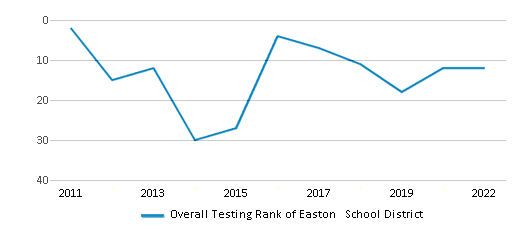
Math Test Scores (% Proficient)
70%
40%
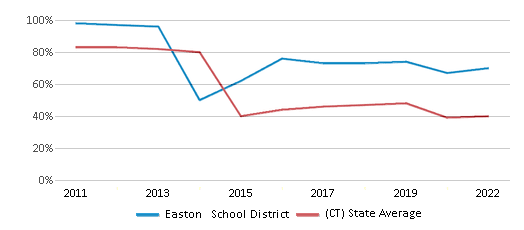
Reading/Language Arts Test Scores (% Proficient)
77%
50%
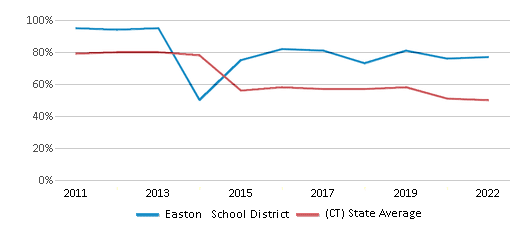
Science Test Scores (% Proficient)
60-64%
47%
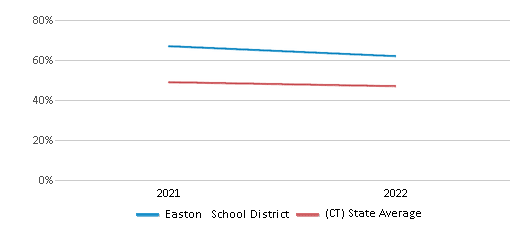
Students by Ethnicity:
Diversity Score
0.43
0.70
# American Indian Students
n/a
381 Students
% American Indian Students
n/a
n/a
# Asian Students
67 Students
6,332 Students
% Asian Students
8%
5%
# Hispanic Students
85 Students
44,965 Students
% Hispanic Students
9%
34%
# Black Students
28 Students
19,832 Students
% Black Students
3%
15%
# White Students
675 Students
54,707 Students
% White Students
75%
41%
# Hawaiian Students
1 Student
132 Students
% Hawaiian Students
n/a
n/a
# Two or more races Students
46 Students
6,568 Students
% of Two or more races Students
5%
5%
Students by Grade:
# Students in PK Grade:
30
14,518
# Students in K Grade:
90
19,819
# Students in 1st Grade:
105
19,906
# Students in 2nd Grade:
96
20,278
# Students in 3rd Grade:
101
15,997
# Students in 4th Grade:
100
16,056
# Students in 5th Grade:
96
13,209
# Students in 6th Grade:
100
5,100
# Students in 7th Grade:
91
3,978
# Students in 8th Grade:
94
3,865
# Students in 9th Grade:
-
67
# Students in 10th Grade:
-
64
# Students in 11th Grade:
-
43
# Students in 12th Grade:
-
54
# Ungraded Students:
-
-
District Revenue and Spending
The revenue/student of $25,202 in this school district is less than the state median of $26,157. The school district revenue/student has declined by 5% over four school years.
The school district's spending/student of $23,050 is less than the state median of $25,225. The school district spending/student has declined by 5% over four school years.
Total Revenue
$23 MM
$12,920 MM
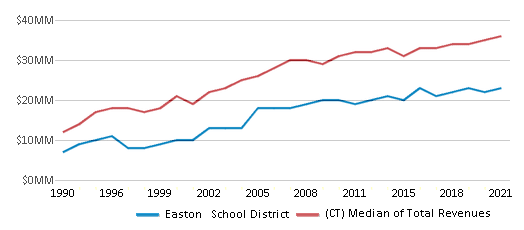
Spending
$21 MM
$12,459 MM
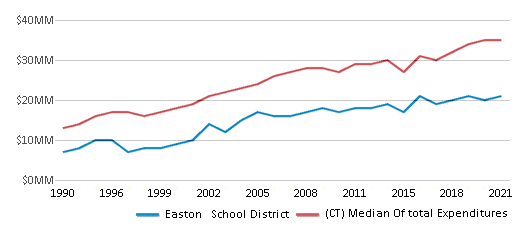
Revenue / Student
$25,202
$26,157
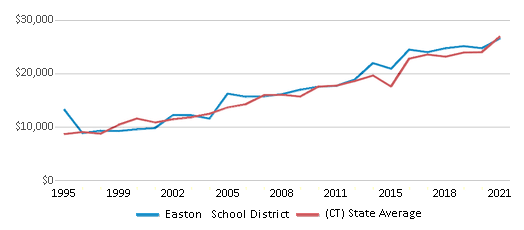
Spending / Student
$23,050
$25,225
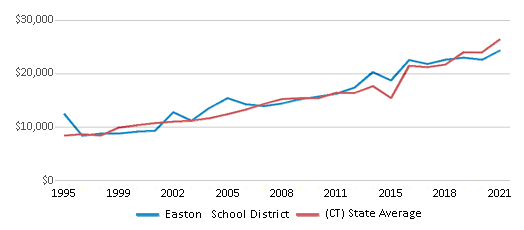
Best Easton School District Public Preschools (2025)
School
(Math and Reading Proficiency)
(Math and Reading Proficiency)
Location
Grades
Students
Rank: #11.
Samuel Staples Elementary School
(Math: 75% | Reading: 78%)
Rank:
Rank:
10/
Top 10%10
515 Morehouse Road
Easton, CT 06612
(203) 261-3607
Easton, CT 06612
(203) 261-3607
Grades: PK-5
| 618 students
Recent Articles

Sexual Harassment at Age 6: The Tale of a First Grade Suspension
A six-year old in Aurora, Colorado, was suspended after singing an LMFAO song to a little girl in his class and reportedly “shaking his booty.” We look at the case and the sexual harassment problem in public schools today.

How Scaffolding Could Change the Way Your Child Learns
This article explores the concept of instructional scaffolding, a teaching method that enhances learning by breaking down complex tasks into manageable parts. It highlights how scaffolding supports students in developing critical thinking skills and becoming more independent learners. The article discusses the benefits of scaffolding, including improved engagement and reduced anxiety, and provides strategies for its implementation across various educational levels.

February 05, 2025
Understanding the U.S. Department of Education: Structure, Impact, and EvolutionWe explore how the Department of Education shapes American education, from its cabinet-level leadership to its impact on millions of students, written for general audiences seeking clarity on this vital institution.





